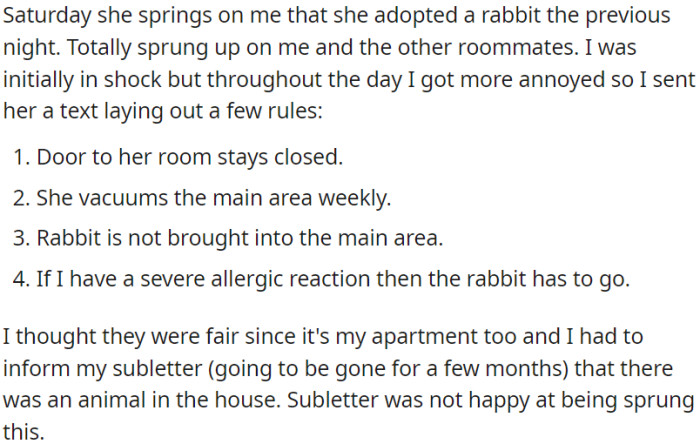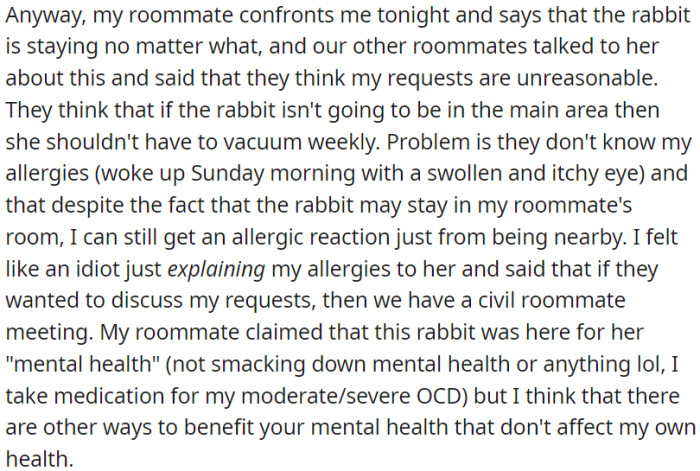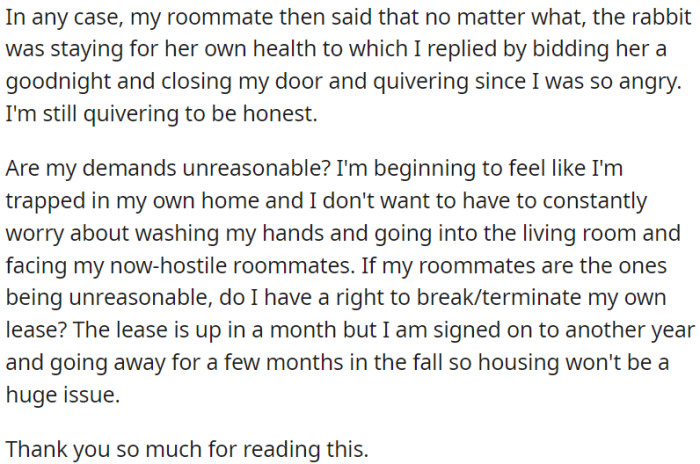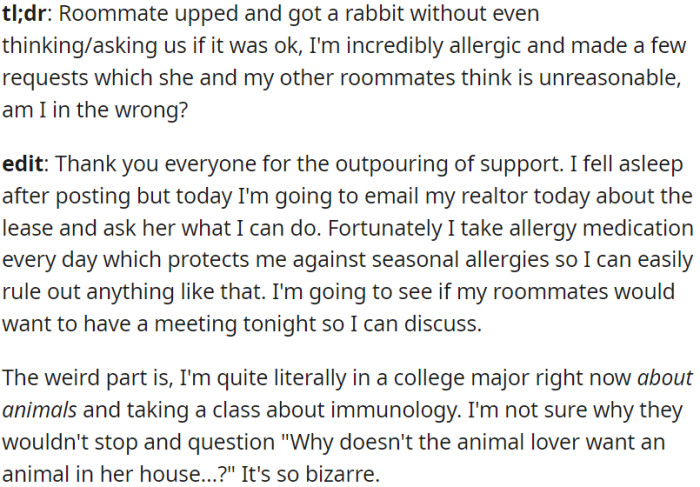Allergic Girl Shocked By Her Roommate Adopting Rabbit Without Consulting and By Other Roommates Taking Her Side
Living with roommates can sometimes be a bit tricky. It's like trying to figure out how to get along with different people who have their own habits and ways of doing things.
Sometimes, it can be a lot of fun, like hanging out with friends. But other times, it can be challenging, and you might run into problems or arguments.
OP is in a frustrating situation with her roommate. Last year, OP and her roommate considered getting a small animal for their apartment. However, due to OP's allergies to small mammals and the hay they live in, they decided against it.
Recently, OP's roommate adopted a rabbit without consulting the other roommates. This decision has left OP feeling annoyed and uncomfortable due to her allergies.
To address the situation, OP sent her roommate a text outlining a few rules, including keeping the rabbit in her room, vacuuming weekly, and the possibility of the rabbit needing to go if OP experiences a severe allergic reaction.
OP believed these rules were fair, considering her allergies and the fact that she had to inform their subletter about the new pet.
However, the roommate confronted OP and stated that the rabbit would stay, regardless of the rules. Other roommates sided with the roommate, claiming that OP's requests were unreasonable, as they were unaware of OP's allergies.
OP now feels trapped in her own home and wonders if she has the right to break or terminate their lease, even though they have signed on for another year.
OP and her roommate had been discussing getting a small pet for their apartment. OP preferred a bird due to her allergies to small mammals, and her roommate was well aware of OP's allergies and health condition.

OP's roommate adopted a rabbit without prior notice. This led OP to establish some rules regarding the rabbit's presence in their shared living space.

All roommates believe OP's requests are unreasonable, and OP feels the need to explain her allergies.

The Role of Communication in Roommate Dynamics
This scenario highlights the importance of clear communication in shared living situations.
Dr. Laura K. Thompson, a social psychologist, emphasizes that misunderstandings often arise from assumptions rather than direct conversations.
Her research indicates that fostering an environment where all roommates feel safe to express their opinions can mitigate conflicts.
The Dynamics of Shared Living Spaces
In shared living situations, conflicts often arise from differing values and priorities. Dr. Anna Kline, a behavioral psychologist, notes that adopting a pet can significantly impact group dynamics. For those with allergies, such as the individual in this situation, the introduction of a new animal can feel invasive and even threatening to their well-being.
Research in the Journal of Allergy and Clinical Immunology highlights how exposure to allergens can trigger severe health responses, emphasizing the importance of respecting personal health boundaries in shared environments.
OP is feeling frustrated because her roommate has chosen to keep a rabbit in the living space they share.

OP is wondering whether she is in the wrong and is planning to discuss the matter with her roommates.

It's wrong to bring a pet into a shared living situation without obtaining agreement from all the roommates involved.

In situations where one person feels their needs are being disregarded, it can create a power imbalance that leads to resentment.
Studies show that addressing such imbalances early can prevent larger issues down the line.
According to research from the National Institutes of Health, open dialogue promotes a sense of agency and fairness among roommates.
Moreover, the emotional reactions to such decisions can be multifaceted. According to Dr. Alexandra Solomon, a relationship therapist, "When someone makes a unilateral decision in a shared living space, it can evoke feelings of betrayal and abandonment, leading to resentment." This sentiment is echoed by Dr. John Gottman, a renowned marriage researcher, who states, "Effective communication is crucial in maintaining harmony; without it, misunderstandings can escalate and damage relationships." Such dynamics can complicate the situation further, as unresolved feelings may hinder open dialogue among roommates.
The only solution for OP is either for the rabbit to go or to seek a resolution that involves her being removed from their lease.

OP, who has a medical condition, is not at fault for not wanting a small mammal around due to health concerns.

OP could consider obtaining an air filter for her room and using a door draft stopper.

Emotional Responses to Boundary Violations
The emotional response of feeling 'shocked' is a common reaction when personal boundaries are violated.
Dr. Bonnie N. Goldstein notes that such feelings can trigger a fight-or-flight response, which complicates rational decision-making.
Understanding these emotional triggers can help individuals navigate their responses more effectively.
Communicating Concerns Effectively
Open and honest communication is crucial in resolving these conflicts. Dr. Rachel Green, a conflict resolution expert, suggests using non-confrontational language to express concerns. Approaching the conversation from a place of vulnerability, such as saying 'I feel anxious about having a rabbit in the apartment due to my allergies,' can help defuse tension and foster understanding.
According to her research, active listening plays a vital role in these discussions, ensuring that all parties feel heard and validated. This can lead to more productive conversations and potential compromises.
OP is not being unreasonable for considering breaking her lease.

OP needs to talk to her landlord about her health issues.

It's concerning that OP's roommate is trying to declare their pet an emotional support animal to gain certain legal rights with landlords.

To resolve conflicts like these, roommates should practice active listening and empathy.
Experts recommend setting aside time for structured discussions about shared living spaces and responsibilities, which can help prevent misunderstandings.
This approach not only addresses current issues but also builds a framework for future discussions.
In addition, establishing a roommate agreement can help set clear expectations regarding shared spaces and responsibilities. Research shows that written agreements can significantly reduce misunderstandings and foster a sense of accountability among roommates. By outlining each person's responsibilities regarding pets and other shared concerns, roommates can mitigate potential conflicts before they arise.
OP's demands are not unreasonable at all. She has legitimate concerns about her health and well-being due to severe allergies, and these concerns should be respected by her roommate and other housemates.
It's disappointing that her roommate made such a significant decision without considering the consequences it would have on OP's life within their shared space. OP should explore her options, including discussing the situation with her realtor and considering whether breaking or terminating the lease is the best course of action for her well-being.
Living in a place where she feels trapped and constantly worried about her health is not a sustainable situation, and she has every right to seek a more suitable living arrangement.
The Importance of Compromise
Finding a middle ground is essential in these situations. Compromise can look different for everyone, but it often requires flexibility and understanding. According to Dr. Esther Perel, a renowned couples therapist, "The quality of our relationships determines the quality of our lives." Successful compromises are indeed rooted in mutual respect and acknowledgment of each person's needs. Creating a safe space for dialogue can help facilitate these discussions, allowing roommates to express their feelings and concerns without fear of judgment. As Dr. Terri Orbuch, a relationship researcher, emphasizes, "Communication is the key to a successful relationship," highlighting the importance of recognizing and discussing feelings openly.
Psychological Analysis
This scenario highlights the complexities of shared living arrangements, particularly when individual needs clash. It's crucial for roommates to engage in open dialogue to address concerns and foster mutual respect.
Analysis generated by AI
Analysis & Alternative Approaches
In summary, navigating roommate dynamics requires effective communication and a willingness to compromise. Understanding the psychological implications of shared living arrangements can lead to healthier relationships and improved well-being. According to psychological research, addressing conflicts proactively is crucial for maintaining harmony in shared spaces.
The Importance of Shared Decision-Making
Empowering all roommates to participate in decision-making processes can reduce feelings of resentment and increase satisfaction. Dr. Adam Grant, an organizational psychologist, states, "When everyone has a voice in the decisions that affect them, it fosters a culture of collaboration and respect." Research suggests that shared responsibility enhances commitment and cooperation among housemates. According to Dr. Sonja Lyubomirsky, a happiness researcher, "Engaging all members in discussions not only boosts satisfaction but also cultivates a sense of belonging." You can find more insights on her work at sonjalyubomirsky.com.
Psychological Analysis
This situation illustrates the complex dynamics of shared living arrangements. It’s essential for all roommates to feel heard and respected, as emotional responses to boundary violations can lead to significant conflict if not addressed properly.
Analysis generated by AI
Analysis & Alternative Approaches
Effective communication and shared decision-making are vital for harmonious living situations.
By prioritizing these elements, roommates can transform potential conflicts into opportunities for collaboration.



